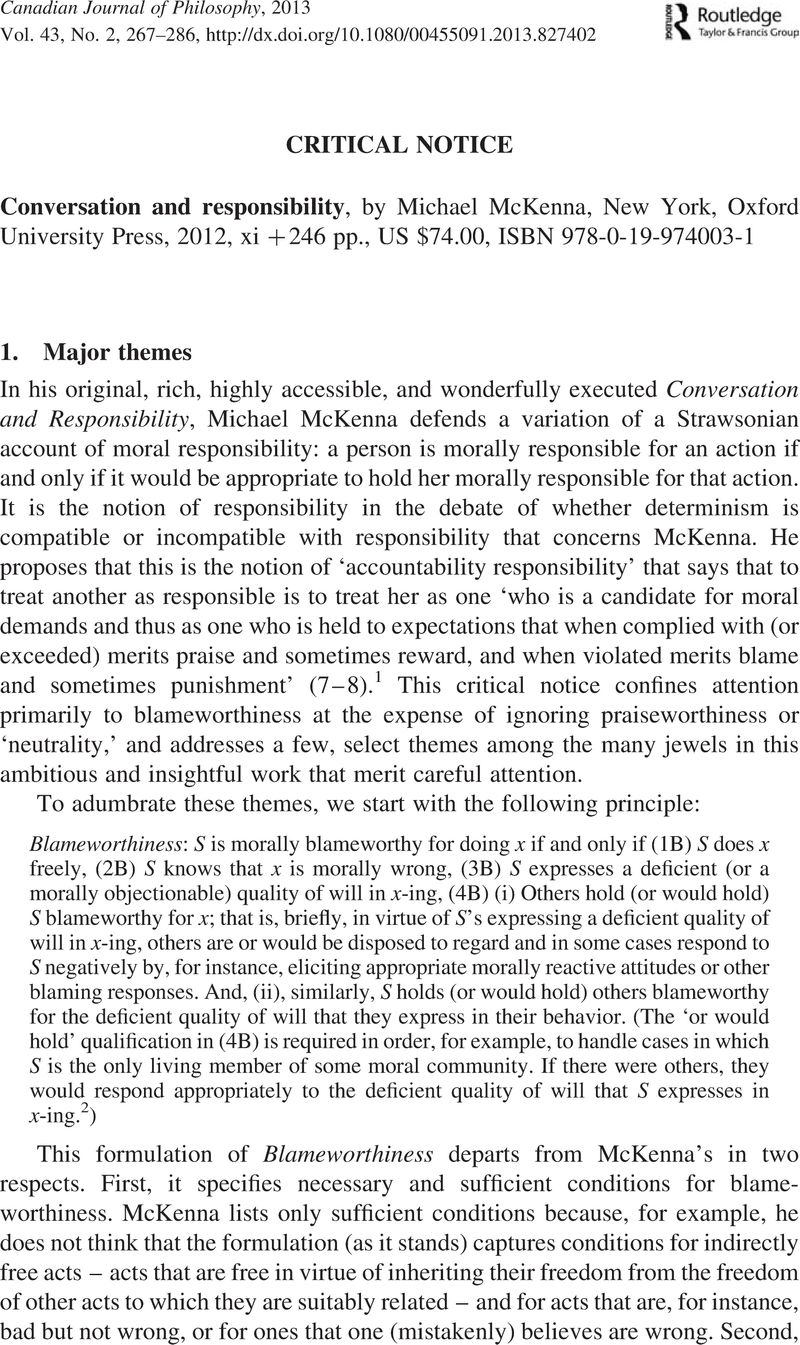No CrossRef data available.
Article contents
Conversation and responsibility, by Michael McKenna, New York, Oxford University Press, 2012, xi + 246 pp, US $74.00, ISBN 978-0-19-974003-1
Review products
Conversation and responsibility, by Michael McKenna, New York, Oxford University Press, 2012, xi + 246 pp, US $74.00, ISBN 978-0-19-974003-1
Published online by Cambridge University Press: 01 January 2020
Abstract
An abstract is not available for this content so a preview has been provided. Please use the Get access link above for information on how to access this content.

- Type
- Critical Notice
- Information
- Copyright
- Copyright © Canadian Journal of Philosophy 2013
References
Chisholm, R. M. 1963. Supererogation and Offence: A Conceptual Scheme for Ethics. Ratio, 5: 1–14.Google Scholar
Chisholm, R. M. 1986. Brentano and Intrinsic Value, Cambridge: Cambridge University Press.Google Scholar
Darwall, S. 2006. The Second-Person Standpoint: Morality, Respect, Accountability, Cambridge, MA: Harvard University Press.Google Scholar
Feldman, Fred. 1997. Utilitarianism, Hedonism, and Desert, New York: Cambridge University Press.CrossRefGoogle Scholar
Haji, I. 2002. Deontic Morality and Control, Cambridge: Cambridge University Press.CrossRefGoogle Scholar
Honderich, Ted. 1969. Punishment: The Supposed Justifications, New York: Harcourt, Brace and World.Google Scholar
McNamara, Paul. 1996a. Making Room for Going Beyond the Call. Mind, 105: 415–450.CrossRefGoogle Scholar
McNamara, Paul. 1996b. “Must I do What I Ought? (or Will the Least I Can Do Do?)”. In Deontic Logic, Agency, and Normative Systems, Edited by: Brown, M. and Carmo, J. 154–173. New York: Springer.CrossRefGoogle Scholar
McNamara, Paul. 2008. “Praise, Blame, Obligation, and Beyond: Toward a Framework for the Classical Conception of Supererogation and Kin”. In Deontic Logic in Computer Science, Edited by: van der Meyden, Ron and van der Torre, Leendert. 233–247. Berlin: Springer Verlag.CrossRefGoogle Scholar
McNamara, Paul. 2011a. “Supererogation, inside and out: Toward an adequate scheme for common-sense morality”. In Oxford Studies in Normative Ethics, Edited by: Timmons, Mark. Volume 1, 202–203. New York: Oxford University Press.CrossRefGoogle Scholar
McNamara, Paul. 2011b. Praise, Blame, Obligation, and DWE: Toward a Comprehensive Framework for the Classical Conception of Supererogation and Kin. Journal of Applied Logic, 9: 153–170.CrossRefGoogle Scholar
Mellema, G. 1991. Beyond the Call of Duty: Supererogation, Obligation, and Offence, Albany: SUNY Press.Google Scholar
Wallace, R. Jay. 1994. Responsibility and the Moral Sentiments, Cambridge, MA: Harvard University Press.Google Scholar
Watson, Gary. 2004. “Responsibility and the Limits of Evil: Variations on a Strawsonian Theme”. In Responsibility, Character, and the Emotions, Edited by: Schoeman, Ferdinand David. 256–286. New York: Cambridge University Press.Google Scholar
Zimmerman, Michael J. 1988. An Essay on Moral Responsibility, Totowa, NJ: Rowman & Littlefield.Google Scholar
Zimmerman, Michael J. 1993. A Plea for Ambivalence. Metaphilosophy, 24: 382–389.CrossRefGoogle Scholar


